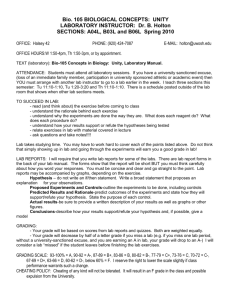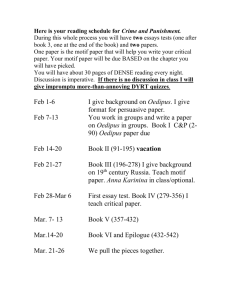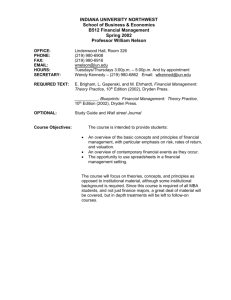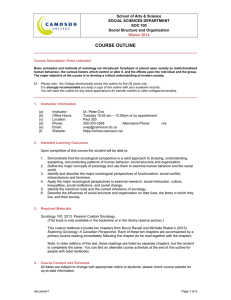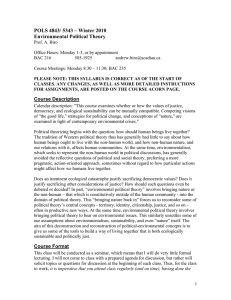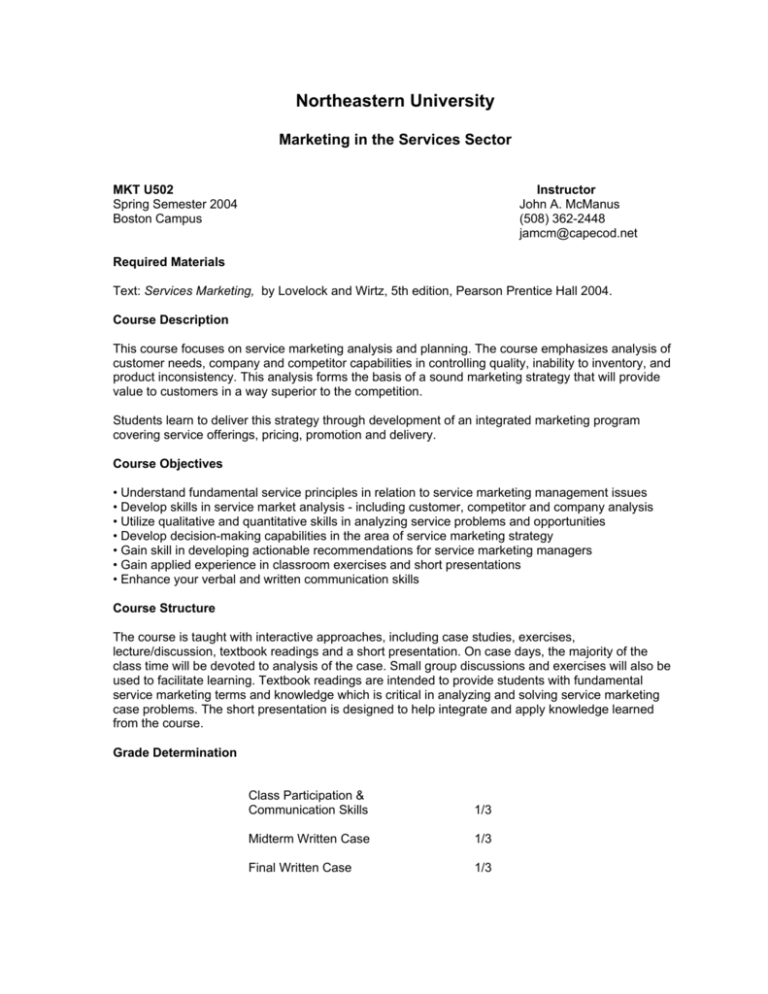
Northeastern University
Marketing in the Services Sector
MKT U502
Spring Semester 2004
Boston Campus
Instructor
John A. McManus
(508) 362-2448
jamcm@capecod.net
Required Materials
Text: Services Marketing, by Lovelock and Wirtz, 5th edition, Pearson Prentice Hall 2004.
Course Description
This course focuses on service marketing analysis and planning. The course emphasizes analysis of
customer needs, company and competitor capabilities in controlling quality, inability to inventory, and
product inconsistency. This analysis forms the basis of a sound marketing strategy that will provide
value to customers in a way superior to the competition.
Students learn to deliver this strategy through development of an integrated marketing program
covering service offerings, pricing, promotion and delivery.
Course Objectives
• Understand fundamental service principles in relation to service marketing management issues
• Develop skills in service market analysis - including customer, competitor and company analysis
• Utilize qualitative and quantitative skills in analyzing service problems and opportunities
• Develop decision-making capabilities in the area of service marketing strategy
• Gain skill in developing actionable recommendations for service marketing managers
• Gain applied experience in classroom exercises and short presentations
• Enhance your verbal and written communication skills
Course Structure
The course is taught with interactive approaches, including case studies, exercises,
lecture/discussion, textbook readings and a short presentation. On case days, the majority of the
class time will be devoted to analysis of the case. Small group discussions and exercises will also be
used to facilitate learning. Textbook readings are intended to provide students with fundamental
service marketing terms and knowledge which is critical in analyzing and solving service marketing
case problems. The short presentation is designed to help integrate and apply knowledge learned
from the course.
Grade Determination
Class Participation &
Communication Skills
1/3
Midterm Written Case
1/3
Final Written Case
1/3
Absences/ Class Participation/ Communication Skills
Attendance in class is required. Absences will affect your class participation grade as you will lose-out
on case discussions and exercises. There are no make-ups for in-class work. If you miss a case
class, you may submit a 2-3 page analysis of that night's case in order to receive credit for that case.
All case write-ups for missed classes are due at the next class meeting. No exceptions!
Since participation is a critical component of learning in the case method, simply attending class is
not sufficient for effective class participation. You must assertively contribute to case discussions in
order to receive credit for class participation. Although quality of contributions is most important, some
quantity is certainly also necessary. Class participation will be evaluated each class.
The business arena requires every executive, and potential executive, to be proficient in
communicating your ideas and recommendations in a clear and persuasive manner. Therefore, you
are expected to put considerable effort into developing your communication/presentation abilities for
class discussion, group interaction, written expression and short presentations.
Performance Expectations
This course requires a high degree of commitment and responsibility on the part of each individual.
You are expected to attend each class, to have thoroughly read and analyzed the required case, and
to contribute to case discussions. Cases deal with real-life business situations. Through discussion of
cases, students develop analytical, decision-making and communication skills. Cases encourage
students to be active participants in analyzing marketing situations and formulating marketing
recommendations. Additionally, you are expected to read the assigned text material and to participate
fully in any in-class activities. The degree of your preparation and participation in class discussions
will greatly determine what you get out of this course.
Study Groups
It is recommended that you form a study group to discuss the assigned case prior to case classes.
The use of email can be an efficient tool to use as a forum for discussion. However, your written case
analysis, in-class assignments and homework must be your work alone, unless otherwise specified.
Case Analysis
For analysis of the cases we discuss in class, you should first have answers to the case questions at
the end of each case. The text readings for that week will highlight the focus of our discussion.
Secondly, you should use all information read and discussed from any previous classes, as well as
your general observations concerning any service marketing issues relevant to each case.
Case Write-up
Each student will be responsible for submitting two written cases. The cases to be written are on the
syllabus. Specific case questions to be addressed are at the end of the case. Additional questions
required may be announced before the cases are due. No late papers will be accepted.
Recommendations
After careful analysis of the true problems that need to be addressed, you must provide specific
recommendations to resolve each of the identified issues. Your recommendations have to be
supported with quantitative and/or logical conclusions drawn from data in the case.
In addition, you need to have an implementation plan with timetables, dependencies, and a method to
measure and control progress.
Grading Class Participation
Grading class participation is necessarily subjective. Some of the criteria for evaluating effective class
participation include:
1. Is the participant present? In order to obtain a grade for class you must attend the class
sessions. Please let me know ahead of time if you plan to be away from our next class.
2. Is the participant prepared? Do comments show evidence of analysis of the case? Can the
participant back up his/her points with financial or other information?
3. Is the participant a good listener? Did you answer the question that was asked? Are the points
made relevant to the discussion? Are your points linked to the comments of others? Is the participant
willing to debate with and convince other class members about the validity of your claims?
4. Is the participant an effective communicator? Are concepts presented in a concise and convincing
fashion? Do you speak with confidence and clarity?
Keep in mind that simply repeating or agreeing with what someone else has said does not constitute
a contribution to the discussion. You need to move the class further on the issue being discussed
and/or offer some other reason (s) for why you may have come to the same conclusion as the
previous speaker. Note as well that you need to stick to the evidence in the case even if you have
personal knowledge of the company, industry or history of the case under discussion. Every case
leaves out information. What we learn from case analysis and discussion is how to make the best
decisions we can in the face of limited information that is typical in the real world.
Note on Academic Integrity:
Northeastern University is committed to the principles of intellectual honesty and integrity.
All members of NEU are expected to maintain complete honesty in all academic work, presenting
only that which is their own work in tests and assignments. If you have any questions regarding the
proper attribution of the work of others, contact your professor prior to submitting the work for
evaluation.
Service Article Assignment
Locate a current article that addresses service marketing issues related to class discussions.
Use any business periodicals or other publications that are applicable to the course.
Write a short paper and give a short presentation to the class including the following:
1) A brief summary of the key point(s) of the article.
2) A discussion of how this article relates to a key concepts examined in this course and the
implications for service marketing practitioners.
3) A personal evaluation of/reaction to the article, based upon the service marketing perspective
gained during the course.
Schedule of Classes
Date
Topic
Readings/Cases
Jan. 9
Course Introduction
Group Exercise
None
Jan. 13
Introduction to Services Marketing
Chapter 1
Four Customers
Jan. 16
Consumer Behavior
in Service Encounters
Chapter 2
Class Exercise
Jan. 20
Case Analysis
Sullivan Ford/
Grove/Fisk
Jan. 23
Positioning Service and
Creating the Service Product
Chapter 3 and 4
Jan. 27
Case Analysis
Giordino/
Brown
Jan. 30
Designing the Communications
Mix for Service
Chapter 5
Feb. 3
Case Analysis
Mass Audubon Society/
Berry
Feb. 6
Pricing and Revenue Management
Chapter 6
Feb. 10
Case Analysis
Accra Beach Hotel/
Kimes/Chase
Feb. 13
Distributing Services
Chapter 7
Feb. 17
Midterm written case due
Visiting Nurse Assoc.
Feb. 20
Designing and Managing
Service Processes
Chapters 8
Feb. 24
Case Analysis
Aussie Pooch Mobile/
Haeckel/Carbone/Berry
Feb. 27
Balancing Demand & Capacity
Planning the Service Environment
Chapters 9 and 10
Mar.9
Case Analysis
Coyote Loco &
Appendix A&B
Mar. 12
Managing People for
Service Advantage
Chapter 11
Mar. 16
Case Analysis
Menton Bank/
Brady
Schedule of Classes
Date
Topic
Readings/Cases
Mar. 19
Managing Relationships
and Building Loyalty
Chapter 12
Mar. 23
Case Analysis
Hilton: Loyalty Wars
Rust/Lemon/Zeithaml
Mar. 26
Customer Feedback and
Service Recovery
Chapters 13
Mar. 30
Case Analysis and group exercise
"design a survey"
Accellion Service Guarantee
April 2
Improving Service Quality
and Productivity
Chapter 14
April 6
Case Analysis
Progressive Insur. (A,B &C)
Epstein/Westbrook
April 9
Organizing for Service Leadership
Chapter 15/
Simons
April 13
Service Article Presentations
April 16
Service Article Presentations
April 20
Due: Written Case
TLContact.com


